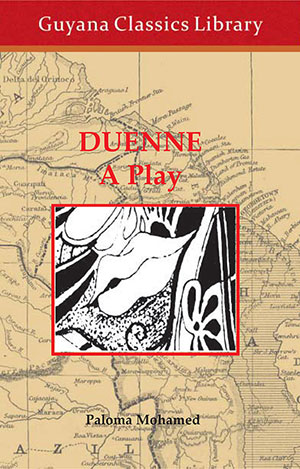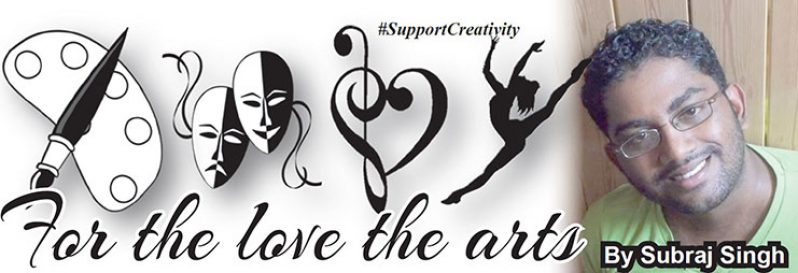PLAYS are often used by playwrights to express the way they see they world or the way they wish to see the world. Even if the playwright writes fantasy or science fiction, there are  usually elements in the work that refer to the real world. For example, in Game of Thrones, the mixture of religion and politics mirrors the way religion can influence politics and political decisions in the real world, while in the Harry Potter books, it might be argued that Voldemort’s hatred for ‘muggles’ highlights themes of racism and ‘othering’. Dr. Paloma Mohamed’s Duenne, now considered a Guyana Classic, does dwell in the realm of fantasy, but like the previously mentioned works, her play uses the fantastical, the mythical, and the element of folklore to address issues relevant to the contemporary world and Guyana.
usually elements in the work that refer to the real world. For example, in Game of Thrones, the mixture of religion and politics mirrors the way religion can influence politics and political decisions in the real world, while in the Harry Potter books, it might be argued that Voldemort’s hatred for ‘muggles’ highlights themes of racism and ‘othering’. Dr. Paloma Mohamed’s Duenne, now considered a Guyana Classic, does dwell in the realm of fantasy, but like the previously mentioned works, her play uses the fantastical, the mythical, and the element of folklore to address issues relevant to the contemporary world and Guyana.
Duenne is unusual in the way it presents only three characters who carry the play from start to finish.
These characters are Madonna, a young, carefree artist; It, described as an “Ageless Mystical Character who can appear at will in either male or female form”, but might actually just be a stand in for God; and then there’s Aisha who the playwright describes as a “cherubic entity representing the life force”. Writing with the bare minimum of characters can, in some ways, be more difficult than writing with a multitude of characters and the way Dr. Mohamed uses her three characters to execute and sustain the tension in what is a really taut storyline, is one of the strong points of her play.
While, like all good works of literature, the play has several layers of meaning that are unveiled to the reader depending on the interpretation of the play. The interpretation that most often comes to the forefront is the one that has to do with themes of creation, pregnancy, motherhood and abortion. The play opens with a scene that is ambiguous with regards to whether It has made love to Madonna as she sleeps. Later Madonna finds out that she is pregnant after It commands Aisha to attach herself to Madonna in the human world. This idea of a celestial being impregnating a mortal woman is one that can be found in mythologies all over the world: in the many conquests of Zeus in Greek mythology, for example, or the mortal women in Hebrew mythology who had sex with the Fallen Angels to produce the terrifying Nephilim.
The ability to highlight global literary influences and the way they are transformed or merged with Caribbean mythology, not only reinforces the connections between folklore and mythical elements all around the world, but also emphasises Dr. Mohamed’s transformative strengths as she takes what already exists (the duenne, for example, is itself a figure from Caribbean mythology) and transforms and reshapes it to suit her particular ideology for this particular play. The way she is able to blend the real and the spiritual – symbolised through the connections between It and Madonna, as well as Aisha and Madonna – underscores the Caribbean element of her work, as Caribbean theatre is heavily built on the spiritual, the ritualistic and the mythological, while showing how these types overlap and influence the human world.
Coming back to the theme of abortion – a sensitive issue, even in modern-day Guyana – the play appears to grapple with some of the ethical and moral questions associated with abortion in the way Madonna grapples with her pregnancy and unborn foetus, represented by Aisha. Madonna, for a lot of the play, seems to reject her pregnancy and her attacks on Aisha and attempts to get rid of Aisha can be seen as evocative of the intent to abort. However, by the end of the play, it does seem as if Madonna has a change of heart, which can be interpreted as the play being pro-life. But, if one really studies the play, the argument being presented by Mohamed is actually much more complex and nuanced than simply being “pro-life” or “pro-choice”, and unraveling and interpreting the messages of the play that relate to the experiences of womanhood and the power of creativity which doubles in both birthing and artistic production (Madonna is, herself, an artist) is one of the more interesting discussions that can be formulated from the play.
Overall, there is a vibrant sense of style to Duenne, which in no way masks the substance of the play, which lends itself to literary scholarship that more academics coming out of Guyana definitely need to pursue. The characters are interesting and the story is sublime. It is a young classic, but in a few years, will become even more worthy of the title.




.png)









